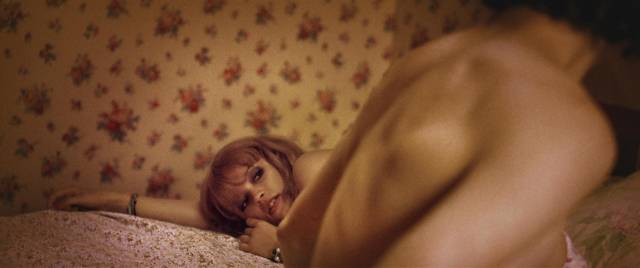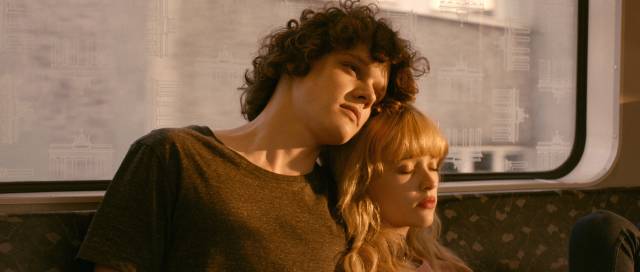
 Girls meet boys, girls ask boys to join them for a sex party, love and other dilemmas ensue. In Bang Gang: A Modern Love Story, Eva Husson’s deliciously confident feature debut, the traditional rules of film romance are swapped for something much more real, timely and sure to be controversial. The film follows the lives of two teenage girls over the course of a summer vacation in which their libidos and consciousness are awaken simultaneously. Putting aside notions of morality and tradition, Husson reveals the issues that plague youths who are trying to come to terms with hormones, obligation and growing up. I spoke to the first time director about working with the young actors, literature and why it’s so important to discuss sex in an open, frank manner.
Girls meet boys, girls ask boys to join them for a sex party, love and other dilemmas ensue. In Bang Gang: A Modern Love Story, Eva Husson’s deliciously confident feature debut, the traditional rules of film romance are swapped for something much more real, timely and sure to be controversial. The film follows the lives of two teenage girls over the course of a summer vacation in which their libidos and consciousness are awaken simultaneously. Putting aside notions of morality and tradition, Husson reveals the issues that plague youths who are trying to come to terms with hormones, obligation and growing up. I spoke to the first time director about working with the young actors, literature and why it’s so important to discuss sex in an open, frank manner.
I wanna preface this by saying I’m glad I was wrong, but after I watched the film I was convinced it would never be distributed in the States.
(Laughs) ...we secured distribution in Toronto, but thank you for thinking that.
You mentioned that you chose the casting director because of their work in Blue is the Warmest Color, which like Bang Gang was great because of the freshness of the faces. Did you go in knowing what you were looking for?
I knew I didn’t want to go the traditional French way, most of the time we see very traditionally beautiful actors and I wanted strong faces and personality. We did the casting 18 months before shooting, we needed to be well prepared.
Did you give the actors very specific directions or did you allow space for improvisation?
For me a part of directing an actor is working with someone who has a world, you work from that. Most of my work came during the casting, I called the actors 5 or 6 times each to make sure I could work with them how I wanted, and that we could relate on an emotional level. I don’t need to hang out with them, but I need the communication to be fluid. We had rehearsals but they were more about finding the right blocking and not losing time on set.

There’s a very classic quality about the film in its look and narration. I feel narration is more used in European films than in Hollywood. How do you think this device links film to literature?
My background speaks for itself, I studied English and Spanish literature, and there’s something I like about literary moments in cinema. I like the power of words and the mood they bring. It’s interesting you think European cinema does this often, because I had to fight to get narration in my film. Decision makers thought the voiceovers were outdated. They were common in the 60s and 70s, but now it’s considered old fashioned. I struggled to have it in my film.
I loved that moment in the film when the students discuss Don Quixote and unless you’re a Spanish speaker you won’t get the first part of the discussion immediately. I speak Spanish so I thought this gave me voyeuristic advantage for a bit.
I wouldn’t say voyeuristic though, it’s more about layers. I’m very playful and I like putting many layers in what I do. As an audience member I appreciate when there are things targeted at me that not everyone will get, but I get. There’s always one or two people who catch the subtext of things you’ve put in your films.
You wrote the screenplay and gave your heroine a very masculine name: George. Was this intended to give her a different sort of empowerment?
It’s relevant in the sense that it brings up the subtext when it comes to what is OK for girls and what is OK for guys. A lot of teenage kids and men get away with things that women could never get away with, there is no reason for that apart from cultural constructions. I wanted to bring that out because I had a little bit of this growing up, my parents are both teachers and told me I could do whatever I wanted, but as a woman filmmaker I realized that some people thought that being a woman would close some doors to me. Society put up boundaries I didn’t have in my family context. It’s wrong and it has to do with representation, so the more you represent women who don’t believe in the validity of these constructs, the better.
My favorite moment in the film was when one of the girls at the party exclaims that she will not let a guy ejaculate on her face because she’d never do that for free, “women get paid for that!” she says. It’s such an empowering moment. It made me think of how so many celebrities deny they are sexual beings when their private moments come to light. There is obviously something very wrong with leaks and stolen property, but do you feel celebrities would do society a favor by owning up their bodies and sexuality?
This is a very strange moment in time, on one point yes, the body is natural, but on the other side it’s delicate to show it on the internet because people can distort who you are. I have a very simple relationship with nakedness, but one shouldn’t be naive to the backlash potential of the internet. Shaming is the norm. It’s important that girls show who they are, but we can’t deny the context.
The world we see in the film often shows tragedy on television sets and news. Sex for the teenagers then becomes a stance against death, they’d rather feel alive through sex than succumb to the chaos that surrounds them. Can you elaborate on the film’s views of sex as life, rather than sex as shame?
What I’m exploring in the film is that in the end all the boundaries of sex and sexuality are simplified to the basic questions: do you love me? Do I love you? How as individuals we go through life and realize life is better with people. I’ve made great connections with people, some of which have made me a better human being. Life isn’t easy, and some of these connections were violent, so what I wanted to show is that violent experiences will make you grow.
 There’s a stigma often associated with STDs and HIV, and in the film one of the characters points out that Nietzsche and Van Gogh had syphilis...
There’s a stigma often associated with STDs and HIV, and in the film one of the characters points out that Nietzsche and Van Gogh had syphilis...
(Laughs) Thank you for noticing that.
...I thought it was brilliant. The film isn’t didactic, but are you interested in people using the film to fight stigma?
It’s definitely not a personal fight (laughs), I wouldn’t go that way, but the truth is I grew up surrounded with people who thought of STDs as parts of life. You get stuff, you go through it and you grow up. It’s 2016, you have to be real, life happens, shit happens. On your deathbed you’re not going to remember your chlamydia (laughs)
Now that the film is coming out in the States in the summer, when people are so used to seeing guns and explosions, but freak out at pubes and penises, what makes you nervous or excited about how people in America will react to the film?
What’s very likely to happen is that the trailer will make it clear enough so that only people who think it looks interesting will show up. The people who attend won’t be shocked. Once I was at a mall in France for a Q&A and it was clear they didn’t know what they had gotten themselves into, they saw the title and the subtitle and expected romance. I probably will benefit from being French, I’m not American so it’s not like American associations can say I’m putting in jeopardy the morals of the country, they’ll blame it on my cultural background (laughs).
I don’t understand why we still see movies about people who fall in love and wait months or years to have sex…
(Laughs) Let’s get real!
Bang Gang: A Modern Love Story opens in theaters on June 17.